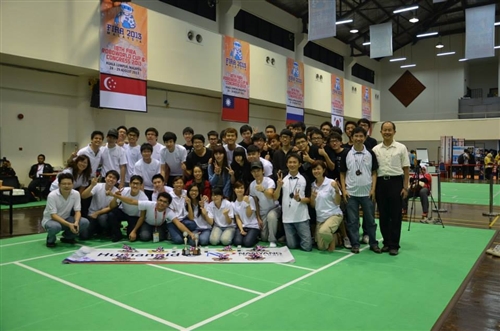TKU Robotics Reaches New Heights at FIRA World Cup
2013/09/03
Google+!

Three professors in the Department of Electrical Engineering, Wong Ching-chang, Cheng Chi-tai and Li Shih-an, led the Soccer Robot R&D team to the 18th Federation of International Robot-Soccer Association (FIRA) World Cup Robot Tournament held August 24th to 29th in Shah Alam, Malaysia. More than fifty teams from twelve countries participated in the event. The TKU Medium-sized Soccer Robot Team grabbed the championship titles for the RoboSot in Robot Soccer and the Motion Challenge, the runner-up for the Vision Challenge, and third place for the Open Creative Challenge. TKU’s Humanoid Robot Team also won the championship in HuroCup Basketball, bringing the total of TKU wins to three golds, one silver and one bronze. This was the ninth time that the R&D team has won the world championship for the Medium-sized Soccer Robot Group, and it was the eighth time running (2006-2013), which is outstanding.
The FIRA World Cup Robot Soccer Tournament this year divided the competition into five categories based on dimensions, functions and other differences. TKU’s Department of Electrical Engineering Robot R&D team participated in two categories, the RoboSot and the HuroCup. Professor Wong Ching-chang said that the TKU medium-sized robot was equipped this year with a completely new high-speed camera and a hardware control device, and in addition to upgrading the robot’s race reaction time, system stability was also improved so that the robot was able to handle the continuous, tight competition. The robot was now also able to maintain a high level of combat capability scoring. In the Humanoid Robot section, the competitive strategy this year was to add even more intelligent control algorithms, which improved the robot’s hoop-shooting accuracy, allowing TKU to win the basketball competition this year.
He Chengyao, a doctoral student in Electrical Engineering and the team leader of the medium-sized soccer robot R&D team, said that there is a degree of difficulty adjusting the tournament for the venue and rules each year. From this year on, the medium-sized soccer robot competition will be adding a technical challenge element to the competition wherein the robots must complete visual positioning, dynamic obstacle avoidance, technology disclosure and other competitive items. The medium-sized soccer robot team relied on new research completed for positioning and obstacle avoidance systems for a successful win of the gold in the Dynamic Obstacle Avoidance Challenge, the silver in the Visual Positioning Challenge, and the bronze in the Technological Disclosure Challenge. Hu Yueyang, a doctoral student n the Department of Electrical Engineering and team leader of the humanoid robot R&D team, said that the Humanoid Group trained at Nanyang Polytechnic in Singapore before the competition to allow the students on the humanoid robot team to experience the customs of another country and for a technological exchange between the two countries. Furthermore, the two sides conducted a simulated contest to accumulate competition experience, which helped the humanoid robot team to achieve success at the 2013 FIRA event.
Chen Gonghan, who participated in FIRA as a member of the humanoid team, stated that although the robots compete in an arena, the team members standing outside the arena were not at all relaxed. The TKU team would take the lead in many of the competitions, but their opponents would trail by a mere point or so. Fortunately they finally succeeded in holding onto their victory. Chen said, “I was shouting with excitement on the sidelines.” This caused everyone there to look at him, and he felt so embarrassed that he just wanted to find a hole to sink into. Another team member, Lin Shuwei, stated that the tournament was hosted this time by Malaysia, and that the local staff and the national teams were all very enthusiastic. “In addition to sharing the different features of our respective cultures, we also made a lot of friends,” Lin said.
Wong Ching-chang said that the TKU Robotics Team dates back to the founding of the Intelligent Control Laboratory in the Department of Electrical Engineering in 1989. The sequence of research revolves mainly around small-scale, medium-sized, humanoid and home services robotics, and the current team has entered the third stage of an energy integration period. The R&D that the team has conducted on full-imagery and full-mobility technology and patents gave the TKU soccer robot a competitive advantage, and the scope of the research has advanced to home services, rescue robots and robotic arm applications. The team will continue to exert efforts in the direction of industrial-academic cooperation to get R&D funding allocated for an increase in opportunities to study the robotics industry. This will allow R&D development to move forward with a focus on the intelligent robot industry.
Viewers: 6626